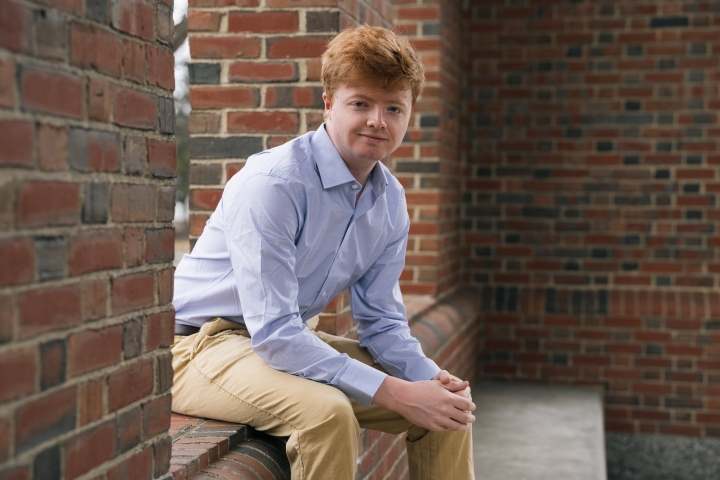John Keating ’23 has been named a James C. Gaither Junior Fellow in the Carnegie American Statecraft Program, dedicated to examining the United States’ role in the world and developing policy ideas for “a more disciplined U.S. foreign policy.”
Each year, the Washington-based Carnegie Endowment for International Peace offers approximately 14 one-year fellowships to graduating seniors to work as research assistants to Carnegie’s senior scholars across 13 research areas, which range from Africa to technology and international affairs.
“It will be exciting to work with people who have impressive experience in both a research and scholarly sense and who have put that experience and those lessons learned into practice in government positions,” says Keating, a government major and public policy minor who grew up in Sun Valley, Idaho, and goes by “Jack.”
Keating will assist with research, preparing congressional testimony, editing op-eds, and serving as a research assistant to leading U.S. foreign policy experts, including American Statecraft director Christopher Chivvis, who most recently served as U.S. national intelligence officer for Europe; and senior fellow Suzanne DiMaggio, recognized as one of the foremost practitioners of diplomatic dialogues with countries that have limited or no official relations with the United States, especially Iran and North Korea.
Keating says an important influence on his study of international relations at Dartmouth is William Wohlforth, the Daniel Webster Professor of Government.
“I was on the London foreign study program in government with him,” Keating says, “and he was a wonderful mentor. The program is entirely dedicated to international relations, and the classes I took with him helped me steer through the international relations courses at the London School of Economics.”
Wohlforth says Keating was an outstanding candidate for the Gaither fellowship.
“Having had Jack in many international relations classes and especially on the London FSP, I can say that the Gaither foundation made the right choice,” Wohlforth says. “Jack’s interest in international politics and U.S. foreign policy and his aspiration for a related career is as strong and consistent as any student I’ve known over my many years at Dartmouth.”
Keating says an independent study and a research project in the Political Violence Field Lab with Associate Professor of Government Jason Lyall, director of the lab and the James Wright Chair in Transnational Studies, were also an influential part of his Dartmouth experience.
At the John Sloan Dickey Center for International Understanding, Keating was part of the War and Peace Fellows Program, which brings students from across the disciplines to explore issues of international conflict and cooperation.
In addition he is currently a researcher with the Class of 1964 Policy Research Shop, a program through the Nelson A. Rockefeller Center for Public Policy and the Social Sciences, where the students are conducting research on the results of mediation in the New Hampshire court system. Their final reports will be presented to a panel of Superior Court judges in May.
The resources he found at Dartmouth have provided a critical launching pad for his career, Keating says.
“The opportunity to come to Dartmouth and interact with scholars who are not only at the forefront of their fields, but who are also so willing to engage in undergraduate research and undergraduate mentoring is phenomenal,” Keating says.
“I’m so lucky that I was able to have all these conversations with Professor Wohlforth in London and to go to Professor Lyall and say, ‘These are questions and projects that interest me, will you help me?’ And the answer was always yes,” he says.
Keating sees the Gaither fellowship as an opportunity, after graduation, to take the next step on his career path.
“I applied specifically to the American Statecraft Program because I believe the United States finds itself at a critical nexus point in its history in which it has to make a lot of important decisions, both ethically and practically, about how it wishes to interact with the rest of the world.”
Keating’s one-year fellowship in Washington starts in September, after which he says he is considering going on to graduate school to get a degree in international relations. He hopes to follow a career that involves policy implementation in government service at, for example, the Defense Department, the State Department, or the National Security Council.
“The opportunity to conduct research on issues that I find really fascinating, and then try to put the lessons learned from those into policy practice, sounds very rewarding and I think important,” he says.
Students interested in learning about the Gaither Junior Fellowships and other fellowship opportunities should visit Dartmouth’s Office of Fellowship Advising.
